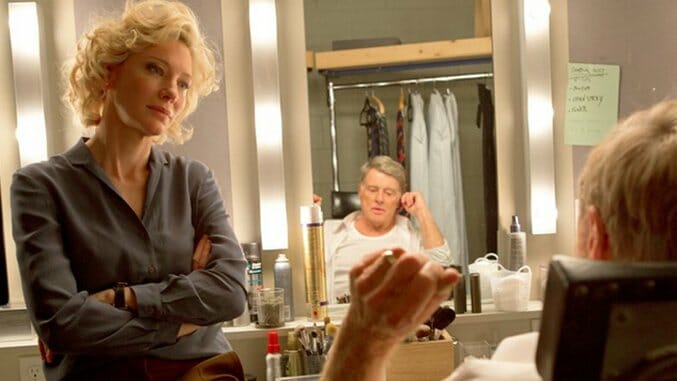
It’s probably much too glib to call James Vanderbilt’s Truth a smart movie for dumb people—but then Truth is one awfully glib piece of work. A well-researched but redundant fictionalization of the debacle that cost broadcasting legend Dan Rather and veteran news producer Mary Mapes their jobs, Truth is a truly weird movie, a celebration of investigative journalism that itself has absolutely nothing new to reveal. Its core point—that television news has shifted from being a public service to a profit center and therefore allowed journalism to be corrupted by financial and political interests—is a valid and worthy one, but it’s also one that virtually any thinking adult who hasn’t had his or her head up his or her ass for the past 25 years already knows.
Truth attempts to dramatize the point by following Rather and Mapes (played by Robert Redford and Cate Blanchett, respectively) as they run down the story of President George W. Bush’s National Guard service—or lack thereof—during the Vietnam War. When they’re misled by a source and the story gets picked apart by the right-wing blogosphere, Mapes, Rather and their team go into full damage control mode, ultimately unable to stop their own destruction at the hands of corporate interests better served by keeping the administration in the White House happy than by revealing the truth.
This is the same basic story Mapes told in her book Truth and Duty: The Press, the President, and the Privilege of Power, which was excerpted in a popular Vanity Fair piece, and which was well covered by the media when Rather sued CBS for breach of contract. Screenwriter and director Vanderbilt duly conveys all of the information, but adds little in the way of artistic interpretation. If you’re at all familiar with the real-life story, you’re not going to get anything new here, and if you’re not the type of person who would have followed the real story as it broke, one presumes you’re not going to be all that interested in a movie that consists of little more than scene after scene in which reporters call sources on phones and stare at documents.
The one thing Truth has to offer—an intimate, personal look at the nitty-gritty of how news teams put their stories together—is consistently compromised by the movie’s lack of faith in the intelligence of its audience. At too many points, characters explain things to each other that everyone in the scene would already know but the audience might not, and it throws the viewer out of the movie every time it happens. The most egregious example comes when Rather tells Mapes that network news didn’t used to be a money-maker, and that everything changed when it started going after profits. The point is legitimate but the scene is ridiculous: This would be such old news to both of these characters that it rings completely false as conversation.
The scene is one of two in the movie that sums up everything the film has to say relating to the downward ethical trajectory of network news. The other is a monologue spoken by Topher Grace as one of Mapes’s associates; he makes the point that CBS’s parent company is attempting a merger which the government could forbid, and this is why they’re not standing behind their anti-Bush story. As a self-contained piece of old-school Hollywood message delivery a la Frank Capra or Stanley Kramer, this is a beautifully written speech that clearly and concisely lays out Vanderbilt’s thesis. It also makes the other two hours surrounding it superfluous, because all of the scenes that take place before and after it are making the same basic points. The movie is all flab, though it kind of gets away with it because it’s so well cast—if you’re going to watch the same two or three scenes over and over again, it helps to have the likes of Blanchett and Redford playing them.
The casting of Redford can’t help but evoke memories of All the President’s Men, a movie that Vanderbilt clearly has on his mind. (He had it on his mind when he wrote the far superior Zodiac as well.) The comparison does not serve Truth well. All the President’s Men worked because of director Alan J. Pakula’s stripped-down minimalism: By reducing his story to the essentials, he created a riveting portrait of men at work, the very kind of social and anthropological study of journalists to which Truth aspires. Vanderbilt doesn’t have Pakula’s confidence in his material or his audience, though; he juices too many scenes with suffocating music and corny reaction shots, as though the viewer is in danger of forgetting how he or she is supposed to perceive what’s happening on screen. It feels phony, but doesn’t offer up any entertainment value in the place of the honesty it’s lacking. So much for the truth.
Director: James Vanderbilt
Writer: James Vanderbilt
Starring: Cate Blanchett, Robert Redford, Topher Grace, Dennis Quaid, Elizabeth Moss
Release Date: October 16, 2015
Jim Hemphill is the writer and director of the award-winning film The Trouble with the Truth, starring Lea Thompson and John Shea. He has written about movies for Filmmaker Magazine, Film Comment and many other publications. You can follow him on Twitter.